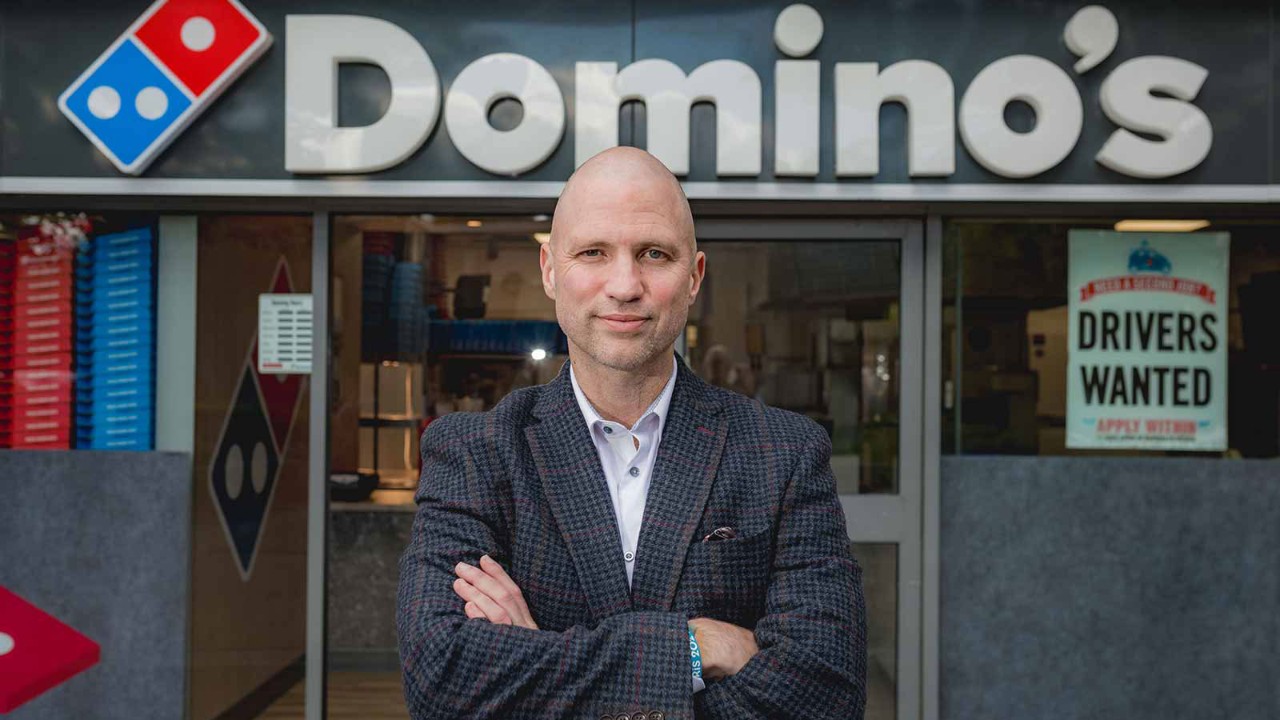
You may have seen the meme on social media that points out that pizzas are a real-time pie chart of the amount of pizza you have left to eat. Clever, but also probably one of the simpler calculations being made around your fast-food staple, certainly if it’s a Domino’s.
Ireland’s insatiable appetite for pizza has helped make Domino’s one of the largest franchisee operations in the country, with 99 locations. Success can also be attributed to an investment and innovation strategy that has made the company a top fast-food brand not just in Ireland but also in the US and UK. Earlier this year, Domino’s Pizza Group – the UK-based master franchise holder for the international business Domino’s – took control of Shorecal Group, its biggest Irish franchisee with 35 operations, in a deal worth over €90m.
It is a vote of confidence in the future, certainly, and Shorecal Group CEO George Bertram ACCA has made expansion and growth his absolute priorities. ‘Getting Domino’s across the country and to more consumers with more locations and providing a better service is what we are focusing on,’ he says.
‘Domino’s is fundamentally a kitchen production centre with a logistics element’

Trend-sensitive
Domino’s global success owes much to the watchful eye it keeps on consumer trends. The company launched apps on iOS and Android as far back as 2010, and recent innovations include a range of sub-650-calorie pizzas for health-conscious customers. What the business knows will never change, though, is the customer expectation that an order will arrive ASAP, and it has long regarded delivery times as one of its greatest strengths.
Bertram says: ‘Domino’s is fundamentally a kitchen production centre with a logistics element to it. Our managers are business managers rather than store managers and are running two different business entities at the same time.’
The delivery space has, of course, been transformed in recent years by a now ubiquitous presence on our streets. ‘The aggregators (such as Eat) are our competitors, although competitors that we also use,’ Bertram says. ‘The upside for us is that they have opened home delivery to a customer base who wouldn’t have used it in the past and who are increasingly open to Domino’s too.
‘That said, if you are not improving, you’re being left behind, and we are constantly innovating to stay ahead. What makes us different is that we control the journey from beginning to end. If anything goes wrong, we can do something about it.’
Bertram can also point to some recent research of his own that demonstrates why keeping a close eye on societal trends pays off. ‘We had always believed our late-night business was our biggest ticket and we staffed accordingly. We never did any research into it because it was so obvious. So I couldn’t understand why we weren’t making more per person on our late night deliveries.
‘Our core late-night market wasn’t who we thought it was’
‘We finally did some research and found our core late-night market wasn’t who we thought it was – students, people on a night out. It was actually night-shift workers – people who wanted a pizza before or after going to work. Knowing this changed how we use our resources.’
A different approach
Originally from South Africa, Bertram has called Ireland home since 2008, after a stint in London. Headhunted to set up a gourmet burger chain in Ireland, timing seemed not to be on his side when the financial crisis crashed over the country. He was, however, committed to making the relocation work – if only, he adds with a laugh, because of the effort he had put into persuading his then partner and now wife to make the move with him.
‘Ireland is similar to South Africa in that we enjoy banter and fun’
CV
2023
Appointed CEO, Shorecal Group
2011
Joins Shorecal as operations manager
2008
Moves to Ireland to become senior operations manager, Gourmet Burger Kitchen
What made things easier was the affinity they quickly felt for their new home. ‘Ireland is similar to South Africa in the sense that we enjoy banter and fun. People are naturally chatty. After living in London, I was used to a very formal approach to business, but here it’s different. When you do a deal, you do it in person, with a handshake and a smile.’
ACCA came into the picture for Bertram relatively recently – he became a member in 2021 – and for a specific reason: IAS 16, the standard for the accounting treatment for property, plant and equipment. ‘IAS 16 has a fundamental impact on how we value our business, and I needed to understand it better,’ he explains. ‘Having the ACCA Qualification allows me to have conversations around the standard with confidence. I was also pleasantly surprised at how business-oriented ACCA is.’
Camaraderie
In a role that requires a relentless focus on data and cost management, Bertram has no hesitation in pointing to something more intangible and key to driving him and the company forward. ‘Genuinely, Domino’s is about the people. Everyone who works here is hands-on. If you go to the store, you dress in the uniform even if you’re the CEO. There’s a sense of camaraderie that I love. We can have days when things go wrong but when we turn it around it’s phenomenal.’
‘You do not know how hard it is to slap a pizza properly’
Pizza has come a long way from the street food of 18th-century Naples to the global phenomenon it is today. The fundamentals, however, would still be very familiar to its first chefs. Slapping is the traditional Neapolitan technique of stretching pizza dough to ensures it binds and doesn’t thin in the centre. It remains the basis of every Domino’s pizza. ‘You do not know how hard it is,’ Bertram says smiling. ‘It is an absolute skill in itself. There are world championship competitions in Las Vegas for it.’
It’s one area – though likely the only one – where an eye for improvement won’t be part of Bertram’s recipe for success in the coming years.
Company timeline
1960
Two brothers buy DomiNick’s pizza restaurant in Michigan, US, renaming it Domino’s five years later, by which time they have three outlets
1967
First franchise opens, heralding a rapid expansion to 200 restaurants by 1978, and a first Dublin location in 1985
1993
Master franchise for UK and Ireland sold to Domino’s Pizza Group, which currently operates around 1,200 stores, 99 of which are in Ireland


